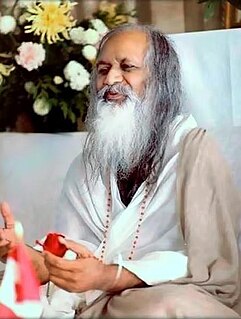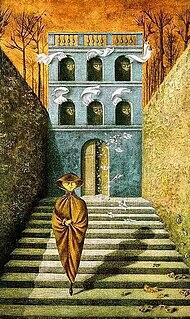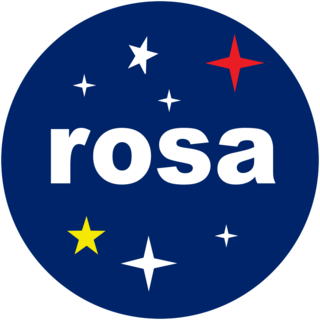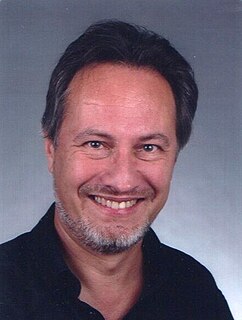Related Research Articles

Transcendental Meditation (TM) is a form of silent mantra meditation advocated by the Transcendental Meditation movement. Maharishi Mahesh Yogi created the technique in India in the mid-1950s. Advocates of TM claim that the technique promotes a state of relaxed awareness, stress relief, and access to higher states of consciousness, as well as physiological benefits such as reducing the risk of heart disease and high blood pressure.

The Committee for Skeptical Inquiry (CSI), formerly known as the Committee for the Scientific Investigation of Claims of the Paranormal (CSICOP), is a program within the transnational American non-profit educational organization Center for Inquiry (CFI), which seeks to "promote scientific inquiry, critical investigation, and the use of reason in examining controversial and extraordinary claims." Paul Kurtz proposed the establishment of CSICOP in 1976 as an independent non-profit organization, to counter what he regarded as an uncritical acceptance of, and support for, paranormal claims by both the media and society in general. Its philosophical position is one of scientific skepticism. CSI's fellows have included notable scientists, Nobel laureates, philosophers, psychologists, educators and authors. It is headquartered in Amherst, New York.
Scientific skepticism or rational skepticism, sometimes referred to as skeptical inquiry, is a position in which one questions the veracity of claims lacking empirical evidence. In practice, the term most commonly references the examination of claims and theories that appear to be beyond mainstream science, rather than the routine discussions and challenges among scientists. Scientific skepticism differs from philosophical skepticism, which questions humans' ability to claim any knowledge about the nature of the world and how they perceive it, and the similar but distinct methodological skepticism, which is a systematic process of being skeptical about the truth of one's beliefs.
The Skeptics Society is a nonprofit, member-supported organization devoted to promoting scientific skepticism and resisting the spread of pseudoscience, superstition, and irrational beliefs. The Skeptics Society was co-founded by Michael Shermer and Pat Linse as a Los Angeles-area skeptical group to replace the defunct Southern California Skeptics. After the success of its magazine, Skeptic, introduced in early 1992, it became a national and then international organization. The stated mission of Skeptics Society and Skeptic magazine "is the investigation of science and pseudoscience controversies, and the promotion of critical thinking."
Transdisciplinarity connotes a research strategy that crosses many disciplinary boundaries to create a holistic approach. It applies to research efforts focused on problems that cross the boundaries of two or more disciplines, such as research on effective information systems for biomedical research, and can refer to concepts or methods that were originally developed by one discipline, but are now used by several others, such as ethnography, a field research method originally developed in anthropology but now widely used by other disciplines. The Belmont Forum elaborated that a transdisciplinary approach is enabling inputs and scoping across scientific and non-scientific stakeholder communities and facilitating a systemic way of addressing a challenge. This includes initiatives that support the capacity building required for the successful transdisciplinary formulation and implementation of research actions.

Bhaktisvarupa Damodara Swami, also known as Dr. Thoudam Damodara Singh and by the honorific Sripada, was a Gaudiya Vaishnava spiritual leader, chemist, writer about religion and science, and poet. In 1971 he received spiritual initiation from A. C. Bhaktivedanta Swami Prabhupada. A few years later he became one of the religious leaders of the International Society for Krishna Consciousness.
HighWire is an internet hosting service in the United States specialising in academic and scholarly publications. HighWire-hosted publishers collectively make over 2 million articles available freely accessible.

Spiritual transformation involves a fundamental change in a person's sacred or spiritual life.

The Romanian Space Agency is a public institution with extra-budgetary funding which coordinates the national space technology research programs and space research-related activities. ROSA was founded in 1991 and is subordinated to the Ministry of Education.

Azerbaijan National Academy of Sciences (ANAS), located in Baku, is the main state research organization and the primary body that conducts research and coordinates activities in the fields of science and social sciences in Azerbaijan. It was established on 23 January 1945.
Visit Philadelphia, formally known as the Greater Philadelphia Tourism Marketing Corporation (GPTMC), is a private, non-profit organization that promotes leisure travel to the five-county Philadelphia region. It was founded in 1996 by the City of Philadelphia, the Commonwealth of Pennsylvania and The Pew Charitable Trusts. In 1998, House Bill 2858, Act 174 designated VISIT PHILADELPHIA, then GPTMC, to serve as the official Regional Attractions Marketing Agency.

The Science History Institute is an institution that preserves and promotes understanding of the history of science. Located in Philadelphia, Pennsylvania, it includes a library, museum, archive, research center and conference center.

Karl E. Peters is a Professor Emeritus of Religion at Rollins College, Winter Park, FL, and former adjunct professor of philosophy, University of Hartford, Hartford, CT and adjunct professor of religion and science, Meadville Lombard Theological School, Chicago. He also is the former editor and then co-editor of Zygon: Journal of Religion and Science, and is a founder, organizer, and first President of the University Unitarian Universalist Society in central Florida. His scholarly research and teaching focuses on issues in science and religion, including the concept of God and evolution, epistemology in science and religion, world religions and the environment, and religious and philosophical issues in medicine.

The Institute of Oriental Studies of the Russian Academy of Sciences, formerly Institute of Oriental Studies of the USSR Academy of Sciences, is a Russian research institution for the study of the countries and cultures of Asia and North Africa. The institute is located in Moscow, and formerly in Saint Petersburg, but in 2007 the Saint Petersburg branch was reorganized into a separate Institute of Oriental Manuscripts.
Varadaraja Venkata Raman is Emeritus Professor of Physics and Humanities at the Rochester Institute of Technology.
Modern environmental education in the United States began to take shape in the late 19th century with the Nature Study movement, which grew out of efforts to promote the field of natural history by naturalists including Harvard professor Louis Agassiz (1807-1873) and Anna Botsford Comstock, whose Handbook of Nature Study was published in 1911.

Oscar Marius Nierstrasz is a Professor at the Computer Science Institute (IAM) at the University of Berne, and a specialist in software engineering and programming languages. He is active in the field of
William John Grassie is an activist for numerous causes, including nonviolence and a freeze on nuclear weapons, reform of science education, and greater dialogue between science and religion. He is the executive director of Metanexus Institute, an organization which worked closely with the John Templeton Foundation to promote "dialogue and interactive syntheses between religion and the sciences internationally."
The Evolution Institute (EI) is a non-profit organization whose mission is to apply science-based solutions and use evidence-based best practices to solve today’s most pressing social issues to improve quality of life.
The John Templeton Foundation is a philanthropic organization that reflects the ideas of its founder, John Templeton, who became wealthy via a career as a contrarian investor, and wanted to support progress in religious and spiritual knowledge, especially at the intersection of religion and science. He also sought to fund research on methods to promote and develop moral character, intelligence, and creativity in people, and to promote free markets. In 2008, the foundation was awarded the National Humanities Medal. In 2016 Inside Philanthropy called it "the oddest—or most interesting—big foundation around."
References
- ↑ "MetaNexus to Host Science & Religion Conference".
- ↑ http://www.regent.edu/acad/global/publications/ijls/new/vol6iss1/4_Final%20Edited%20Middlebrooks_pp65-83.pdf [ bare URL PDF ]
- ↑ Hansell, Gregory, ed. (2011). H+/- Transhumanism and its Critics.
- ↑ Faye Flam, Philadelphia Inquirer, May 9, 1999, “Science, at a High Power/Is God in the Details?”
- ↑ David O’Reilly and Melissa Dribben, Philadelphia Inquirer, July 9, 2008, “An Investor in Money and Faith.”
- ↑ http://articles.philly.com/2002-10-13/news/25352919_1_metanexus-institute-spiritual-transformation-research-proposals [ bare URL ]
- ↑ "Theologians and Scientists Hold Interdisciplinary Conference". 4 June 2004.
- ↑ Christian, David (2004). Maps of Time: An Introduction to Big History . University of California Press. ISBN 9780520235007.